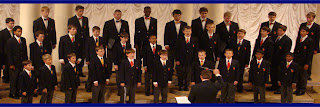 A roster of great musicians participated, including Rodney Wynkoop and his choral forces from Duke University, Greg Hobbs and singers from Highland Park Presbyterian Church in Dallas, and instrumentalists from the Los Angeles Philharmonic. The repertoire of the festival included masses and instrumental music by Franz Josef Haydn, who died 200 years ago. But it also included three international premieres, a variety of other music, and the Mozart "Requiem", which was performed at Haydn's memorial service in June of 1809.
A roster of great musicians participated, including Rodney Wynkoop and his choral forces from Duke University, Greg Hobbs and singers from Highland Park Presbyterian Church in Dallas, and instrumentalists from the Los Angeles Philharmonic. The repertoire of the festival included masses and instrumental music by Franz Josef Haydn, who died 200 years ago. But it also included three international premieres, a variety of other music, and the Mozart "Requiem", which was performed at Haydn's memorial service in June of 1809.With so many great musicians performing such great repertoire, it might surprise you to know that my greatest musical memory comes from a group of boys and young men from Atlanta. The storied Atlanta Boy Choir performed in the festival, adding another successful international tour to their long history of outstanding musicianship.
 On July 2, in Vienna's famed Musikverein, conductor David White led the Atlanta singers in a program that received ovation after ovation from the savvy Vienna audience, filling the silences between the songs and trying to give some small reward to the young but consummate musicians.
On July 2, in Vienna's famed Musikverein, conductor David White led the Atlanta singers in a program that received ovation after ovation from the savvy Vienna audience, filling the silences between the songs and trying to give some small reward to the young but consummate musicians.Did I mention that this was happening in Vienna? The ground zero of Boy Choirs? One might think that this audience would greet another Boy Choir with skepticism. But it only took four descending tones, the same tones used by Tchaikovsky to give the world his great piano concerto; the same tones Van Cliburn then played in Moscow to give musical warmth to the cold war. Those tones: sol, mi, re, do; now sung by a small boy on stage left, beginning Ralph Vaughan Williams' setting of the scriptural invitation to the Lord's table, "O taste and see...". Now it was an invitation to join these young singers for a few minutes while they celebrated all that is possible when fine art meets fine artists. "O taste and see how gracious the Lord is."
David White is a good friend, and he comes from a family of great musicians. We usually see one another at choral conventions, and once our conversation reaches the end of our family updates, we tend to resume a discussion of the generally low expectations of musical understanding and performance that people express toward children. I believe, and David's choir offers proof, that young singers are extraordinarily capable. In the 1000-year history of choral music, it is a phenomenon of the last 200 years that women would take the places of boys in the soprano and alto sections. Our greatest choral music was written for just these kinds of voices.
I often see and hear examples of the kind of well-meaning music education that espouses ideas like, "We must be careful with young singers, preserving their fragile voices and self-images by keeping things light and fun." I appreciate anyone whose motivation is the best interests of children. But I stood at the backstage door as these young men from Atlanta left the stage. Having worked very hard for a year, only to receive these great ovations from the world's most informed audience, their self-images couldn't have been better. And David's careful and expert approach to vocal technique left their voices anything but fragile. They turned around and sang as part of a large festival chorus in Haydn's "Heilgmesse," and were still giving their all 45 minutes later.
While the International Haydn Festival was going on, our few English-language television channels were all glued to coverage of the death of Michael Jackson. People my age remember when he burst onto the scene as a tiny boy, and continued to captivate people through most of his 50 years with unique musical performances. Now that his memorials are subsiding, I want to celebrate the consummate musicianship of another group of young boys, and the hard work that brought them to a point of international triumph. They are unlikely to grow up to the kind of fame that ensures wild eccentricities, and that is fueled by record sales. They will become teachers and lawyers and fathers and scoutmasters. But they deserve to be celebrated as artists while they are still in their boyhood, for they succeeded in the attainment of the artist's fondest goal. They prepared and performed the greatest art, and their audience heard and understood.
My favorite moment of their performance came in the presentation of Viennese composer Anton Bruckner's piece "Os Justi." Here are it's words in English translation (with a pertinent edit), a fitting benediction:
The mouth of the righteous utters wisdom,
and his tongue speaks (sings?) what is just.
The law of his God is in his heart;
and his feet do not falter. Alleluia.
No comments:
Post a Comment